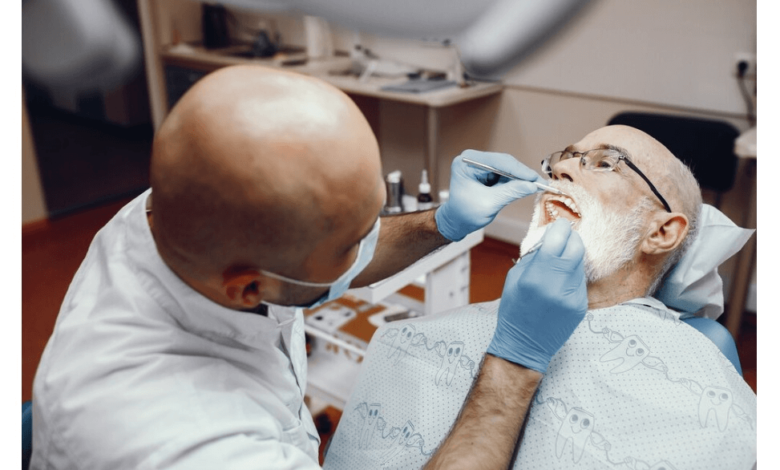Identifying Early Signs of Mouth Cancer

Mouth cancer, also called oral cancer, is a prevalent oral health hazard these days, mostly associated with habits such as tobacco and alcohol consumption. This type of cancer can start in various parts of the mouth, including the cheeks, lips, tongue, gums, or the roof of the mouth. Some of the mouth cancers are unfortunately not associated with pain and other symptoms in their early stages but spread very quickly when advanced. Therefore, recognising the their signs early on can make a big difference in treatment and outcomes. Let’s discuss how you can identify these early signs and protect your health.
Early Signs and Symptoms
Early detection of mouth cancer is crucial for ensuring effective treatment and improving outcomes. By being vigilant of some key mouth cancer symptoms and signs, you can potentially catch it in earlier stages:
Mouth Ulcers that Do Not Heal:
A sore or ulcer in the mouth that does not heal can be a sign of cancer.
Persistent Mouth Pain:
Continuous pain or discomfort in the mouth that doesn’t go away is another frequent symptom of mouth cancer.
White or Red Patches:
Abnormal patches in the mouth like leukoplakia (white patches) or erythroplakia (red patches), could indicate cancer or precancerous changes. Without treatment, these patches might develop into cancer. Oral thrush, a fungal infection, can also cause similar red and white patches, and a certain form of this may be cancerous too.
Read also:: Why Azure Cost Management is Crucial for Businesses: Understanding the Financial Impact
Difficulty Swallowing:
Mouth cancer can make chewing and swallowing painful or uncomfortable. You might feel like food is sticking in your throat or experience coughing while eating.
Changes in Speech:
Cancer in the mouth can affect your voice. It may become quieter, husky, or sound like you have a permanent cold. Speech might become slurred or difficult to pronounce certain sounds.
Neck Lump:
Swelling in the neck due to persistently enlarged lymph nodes is another mouth cancer symptom. Lumps that persist and grow are more concerning for cancer.
Unexplained Weight Loss:
Losing weight without trying can be a sign of various cancers, including mouth cancer. Difficulty eating due to pain or swallowing issues can contribute to weight loss.
Other Signs:
Thickened Lip
LumpUnusual Mouth Bleeding
NumbnessLoose Teeth with No Clear Reason
Jaw Movement Difficulties
While there isn’t a regular test to check for oral cancers, they can often be found early through:
Self-Examination:
Check your mouth regularly using a mirror for changes like white patches, sores, or lumps. This is especially important if you use tobacco or drink alcohol, which raises your risk.
Dental Check-Ups:
Your dentist examines your whole mouth thoroughly to catch oral cancers early, including precancerous changes.
Special Techniques:
Some dentists use special dyes or lights like toluidine blue or fluorescent lights to spot unusual areas, especially if you’re at higher risk. If they find suspicious spots, they may do a biopsy to check for cancer cells.
Finding oral cancers early can really help improve how well the treatment works.
When to See a Doctor
Understanding when to seek professional help for oral health issues is crucial for timely treatment and better outcomes. Here are key signs that should prompt you to schedule a visit with your dentist or doctor:
Persistent Lesions:
Any sores or unusual spots in your mouth, like lasting red or white patches, ulcers, lumps, or growths that haven’t healed within two weeks, should be checked by a healthcare professional. If you wear dental alignersor braces, ensure they fit comfortably and do not cause abrasion or hurt anywhere. If they do, they might lead to a sore spot in due time.
Difficulty with Basic Functions:
Problems like trouble chewing, swallowing, or speaking need prompt evaluation by a dentist or doctor.
Pain, Numbness, or Changes in Bite:
If you experience unexplained pain, discomfort, numbness, or noticeable changes in your bite, it’s important to seek immediate evaluation.
Non-Painful Symptoms:
Remember, not all oral health issues cause pain. Even painless symptoms such as unusual spots or growths should be examined to rule out potential problems.
If you are using dental aligners and noticing any of these above signs, during your appointment, don’t hesitate to discuss any concerns or questions with your dentist. Getting timely and appropriate guidance can even avoid the risk of developing mouth cancers and greatly influence treatment success when caught early.
Treatment Options
Managing oral cancer involves several tailored treatment options based on the cancer’s specifics and individual health factors. Here’s an overview of the main treatment modalities:
Surgery:
Surgery is critical for removing tumours and affected tissues. Depending on the site and extent, the affected tissues are removed. In extensive cases, reconstructive surgery may follow to restore function and appearance using tissue from other body areas.
Radiation Therapy:
High-energy beams are used to destroy cancer cells or inhibit their growth. This is often used in combination with other treatments for comprehensive management.
Chemotherapy:
Anti-cancer drugs administered orally or intravenously to target and kill cancer cells throughout the body.
Targeted Therapy:
Drugs that directly target cancer cells, sparing healthy ones. These include monoclonal Antibodies and lab-made immune proteins, that help attack cancer cells effectively and minimize harm to normal cells.
Immunotherapy:
Enhances the body’s immune system to combat cancer cells effectively.
These treatment options may be used alone or combined based on cancer stage, overall health, and specific characteristics. Discussing these options with healthcare providers helps understand their purpose, potential side effects, and strategies for effective management of treatment effects.
Conclusion
Detecting mouth cancer early is vital for effective treatment. Look out for persistent mouth ulcers, unusual patches, difficulty swallowing or speaking, neck lumps, and unexplained weight loss. Regular self-checks and dental visits are crucial to catch this cancer in early stages. If you notice any changes, seek medical help promptly for evaluation and personalized treatment options. Early detection prevents spread and improves outcomes for those affected by mouth cancer.





